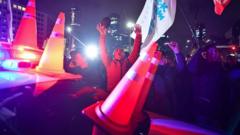In a tumultuous night that gripped South Korea, President Yoon Suk Yeol announced martial law, citing threats from “anti-state” forces sympathetic to North Korea. The unexpected proclamation came during a live address to the nation, disconcerting many and inspiring immediate public outrage. Among those witnessing the events unfold was 19-year-old Hwang, who expressed disbelief upon seeing his country’s democracy come under threat. “It’s important for me to be here to show that we are against what Yoon tried to do,” he stated amidst protestors outside the National Assembly in Seoul.
After Yoon’s announcement at 23:00 local time, the chaos erupted as police barricaded the assembly, signaling the suspension of all parliamentary activities under martial law. As fear permeated the atmosphere, thousands gathered despite heavy security, rallying against what they perceived as a regression toward authoritarianism reminiscient of South Korea’s military past. Juye Hong, a university student, expressed disbelief that such a turn of events could unfold in the 21st century.
The atmosphere became increasingly charged as opposition leaders attempted to galvanize the public. The Democratic Party’s Lee Jae-myung called for protests at the assembly and urged lawmakers to assemble to counteract the martial law order. A sea of protestors, many clad in dark winter jackets, clashed with police while some individuals risked their safety by lying in front of military vehicles.
While tension rose outside, life in other parts of Seoul carried on almost normally, though confusion lingered among the populace. Fearful citizens shared concerns about their safety and the potential for radical change in their governance. Journalist Ahn Gwi-ryeong found herself facing soldiers at gunpoint, reflecting that "it felt like witnessing the regression of history."
In a frantic race against time, lawmakers attempted to breach the assembly's security to mount a counter-vote against the martial law. With the stakes high, and memories of historical oppression echoing in the minds of many, the determination of opposition legislators became clear. With barricades hastily erected, they worked to secure the assembly and organized a vote that would ultimately defeat Yoon's order.
By 01:00 local time, 190 lawmakers cast a unanimous vote against the martial law. Less than two hours after the announcement, Yoon was forced to concede, stating he would withdraw the order once he could assemble his cabinet. Cheers erupted outside the assembly as the populace celebrated their victory and temporary preservation of democracy.
However, the event is expected to have lasting political ramifications. As dawn broke, calls for Yoon’s resignation intensified amid ongoing impeachment proceedings. Democratic Party member Yang Bu-nam emphasized, "We are a strong democracy… But the Korean people want to be safe - President Yoon must resign or be impeached," signaling heightened tensions in a nation still grappling with the echoes of its historical struggles for democratic governance.






















